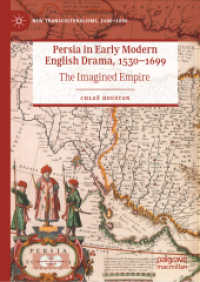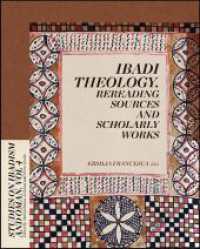- ホーム
- > 洋書
- > 英文書
- > Business / Economics
Full Description
Originally published in 1984, this was the first study to define and rationalise the character and functions of the plantation in the contemporary world. The author, Edgar Graham, was uniquely placed to do this having had long experience of Unilever's plantations in West Africa, Zaire, Malaysia and the Pacific. Writing as a pragmatist, from observed fact, his starting point was the fact that the 'modern plantation' bears very little resemblance to that of the past, on which most hostile accounts are still based. Two changes altered the very nature of the issue: First, the 20th Century plantation existed within an economic framework controlled by independent governments. Secondly, the rapid development in technology has revolutionised most aspects of plantation production. The result, it is argued, is that the modern plantation offers host governments the option of using this as the most efficient way of utilising available factors of production to provide a maximum social return. Exemplified by case studies, this study presents a powerful argument for the continue use of the plantation system when properly applied to a variety of tropical crops.
Contents
Part 1: The Plantation and Its Characteristics: Analysis and Economic Theory 1. The Plantation is a Production System 2. Development Economics and the Evolution of Plantations 3. Foreign Ownership and Foreign Management: Costs and Benefits 4. The Role of Management 5. The Plantation and the Host Economy: Studies in Linkages and Comparative Advantage Part 2: Applying the Plantation Principle 6. Differing Institutions and Alternative Strategies 7. Two Variants of the Modern Plantation: FELDA and Mumias 8. Cane Sugar: Factors Affecting the Market for the Production Processes of this Commodity 9. Cane Sugar: Three Case Studies I 10. General Conclusions and Summary.








